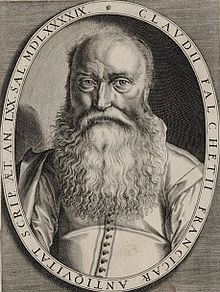- Claude Fauchet (historian)
-
Claude Fauchet (3 July 1530 – January 1602) was a French historian and antiquary.
He was born at Paris; of his early life few particulars are known. He applied himself to the study of the early French chroniclers, and proposed to publish extracts which would throw light on the first periods of the monarchy. During the Wars of Religion, when he was forced to flee Paris with Henri III in 1589 and could not return until 18 April 1594, he lost a large part of his books and manuscripts to the soldiers of the duc de Mayenne. His losses he accounted to be about two thousand books and manuscripts, possibly an exaggeration (Holmes and Radoff 1929). He then settled at Marseilles.
Attaching himself afterwards to François de Tournon, he accompanied him in 1554 to Italy, whence he was several times sent on embassies to the king, with reports on the siege of Siena. His services at length procured him the post of president of the Chambre des Monnaies (29 March 1569, and thus enabled him to resume his literary studies.
Having become embarrassed with debt, he found it necessary in 1599, at the age of seventy, to sell his office; but Henri IV, amused with an epigram, eventually pensioned him, with the title of historiographer of France.
Fauchet has the reputation of an impartial and scrupulously accurate writer; and in his works are to be found important facts not easily accessible elsewhere. He was, however, entirely uncritical, and his style is singularly inelegant. His principal works (1579, 1599), taken together, form a history of antiquities of Gaul and of Merovingian and Carolingian France, and reviews of the dignities and magistrates of France, of the origin of the French language and poetry, of the liberties of the Gallican church. A collected edition in a single massive volume was published in 1610. Fauchet took part in a translation of the Annals of Tacitus (1582).
Notes
References
- Urban T. Holmes and Maurice L. Radoff "Claude Fauchet and His Library" PMLA 44.1 (March 1929), pp. 229-242. Brief details of his life, lists of published works, of volumes identified as from his library and works cited by Fauchet.
 This article incorporates text from a publication now in the public domain: Chisholm, Hugh, ed (1911). Encyclopædia Britannica (11th ed.). Cambridge University Press.
This article incorporates text from a publication now in the public domain: Chisholm, Hugh, ed (1911). Encyclopædia Britannica (11th ed.). Cambridge University Press.
Categories:- French historians
- French antiquarians
- 1530 births
- 1602 deaths
Wikimedia Foundation. 2010.

